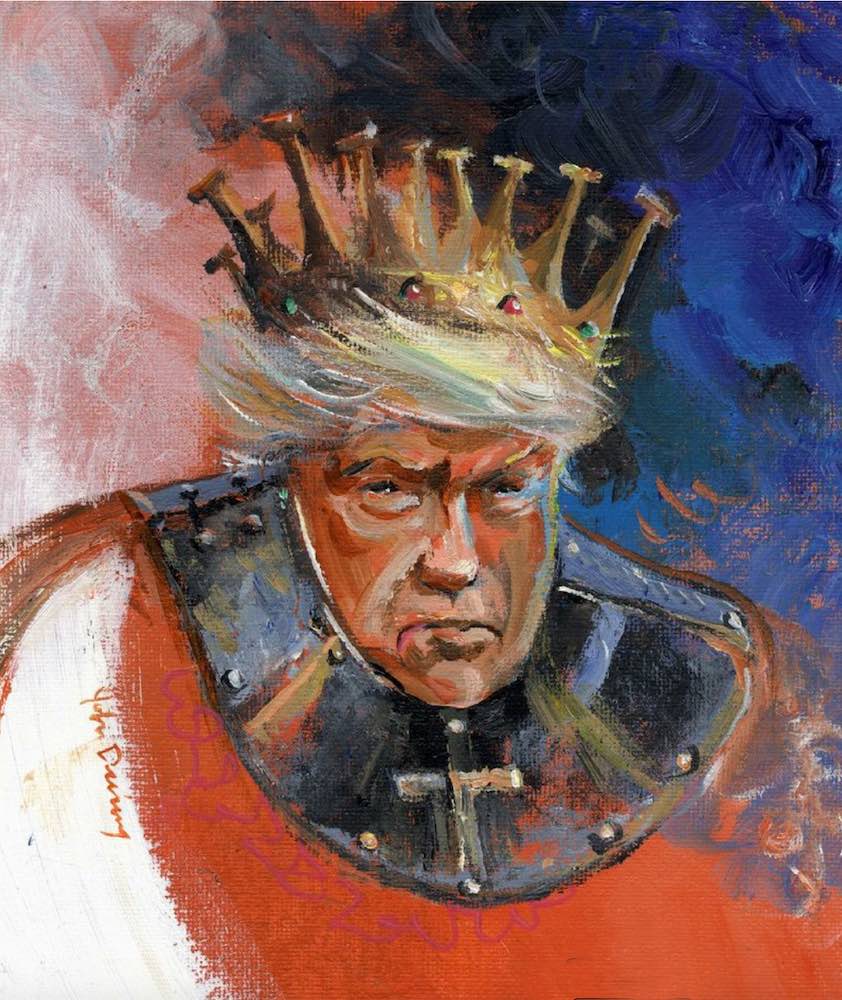There is something inherently Shakespearean about DC. It’s easy to picture Lincoln wandering the corridors of the White House reciting his favorite passages. In his journal, John Adams once observed a drunk at a party who “railed and foamed” in “as wild mad a manner as King Lear.” Surprisingly, the gruff, bearded Ulysses S. Grant, when young and slender, played Desdemona in Othello — although his Othello ultimately was too uncomfortable with a male and a professional actress was brought in.
The presidency of Donald Trump has inspired numerous comparisons to Shakespearean characters. Maureen Dowd famously compared Trump to Macbeth. In the Atlantic, Eliot A. Cohen likened Trump to Richard II, whose deposition and murder led to the Wars of the Roses. Trump certainly shares Richard’s arrogance, lack of respect for the military, and self-destructive hubris.

Ron Charles, in Washington Book World, noted the similarity of Trump’s unpredictability to King Lear’s fitful eruptions. Even Fox News got into the action. Congressional correspondent Chad Pergram wrote:
Casual Shakespeare observers ignore his play “Coriolanus.” But the work named after a Roman leader lends particular insight into where we find American politics between the 2020 election and inauguration day.
Consider the President disputing the election results. Should we have anticipated anything else?
“Why did you wish me milder? would you have me False to my Nature?” is an interrogative posed by the title character Coriolanus to a Roman senator in Act III, Scene 2.
In other words, should we have anticipated President Trump to respond differently to the election outcome? He telegraphed this move. As Shakespeare writes, it was doubtful Mr. Trump would be “False” to his “Nature.”
Now, of course, with the tragic events of January 6 in the Capitol, and the subsequent impeachment, it is hard to find a Shakespearean character monstrous enough to represent Trump. In his book Tyrant: Shakespeare on Politics (2018), Stephen Greenblatt describes Coriolanus in Trumpian terms. Like Coriolanus, Trump is a raging bully with contempt for what he perceives as the lower classes. In another sense he is utterly unlike the Roman soldier, for Coriolanus is dominated by his mother — and Trump is anything but a warrior. Like Coriolanus, Trump is a narcissistic, overgrown, vindictive child.
Unlike Trump, however, Coriolanus is no hypocrite. He cannot bring himself to ask for the votes of the people he despises. His recommendation is to eliminate free food for the poor and the office of tribune, which gives them what little voice they have. He is immediately accused of treason. He is banished. He turns to the Volscians, Rome’s bitter enemy. And he is destroyed by them.
Columbia professor James Shapiro, author of Shakespeare in a Divided America: What His Plays Tell Us About Our Past and Future (2020), said in a BBC podcast:
The link between Shakespeare and America goes back to pre-revolutionary times when Hamlet’s famous lines, “To be or not to be,” were appropriated by both those who wanted to get rid of the British and defenders of the British in America. And by the time the second president of the United States, John Quincy Adams was installed, we had presidents grappling with Shakespeare.
So Shakespeare becomes a way for Americans to grapple with social and political issues that are not easily spoken about or confronted. Americans are really bad at speaking about the things that divide us, race, immigration, politics, the cultural gulf that is enormous right now. And Shakespeare, time and again in American history, has been a way of speaking to those concerns.
What could be a better environment to explore those concerns than the nation’s capital?
Shapiro continued:
And as we are convulsed, at the time of this pandemic, by so many forces, economic and social and political, we would do well to understand what are the fault lines in this culture, so that we can pull together and move forward. But unless we understand some of the darker forces circulating in American history, that are still with us, we’ll be ill-equipped to do so.
When theater returns at full force on the District’s stages, Shakespeare should be our first priority. He is our greatest authority on the use and abuse of power.




